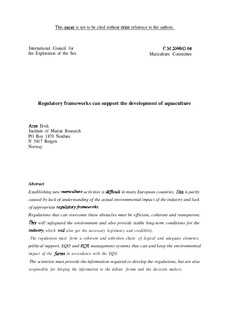| dc.contributor.author | Ervik, Arne | |
| dc.date.accessioned | 2012-10-18T05:57:06Z | |
| dc.date.available | 2012-10-18T05:57:06Z | |
| dc.date.issued | 2000 | |
| dc.identifier.citation | This report is not to be cited without prior reference to the author | no_NO |
| dc.identifier.uri | http://hdl.handle.net/11250/106101 | |
| dc.description.abstract | Establishing new mariculture activities is difficuIt in many European countries. This is partly
caused by lack of understanding of the actual environmental impact of the industry and lack
of appropriate regulatory frameworks.
Regulations that can overcome these obstacles must be efficient, coherent and transparent.
This will safeguard the environment and also provide stable long-term conditions for the
industry, which will also get the necessary legitimacy and credibility.
The regulations must form a coherent and unbroken chain of logical and adequate elements;
political support, EQO and EQS, management systems that can and keep the environmental
impact of the farms in accordance with the EQO.
The scientists must provide the information required to develop the regulations, but are also
responsible for binging the information to the debate forum and the decision makers. | no_NO |
| dc.language.iso | eng | no_NO |
| dc.publisher | ICES | no_NO |
| dc.relation.ispartofseries | ICES CM Documents;2000/O:4 | |
| dc.subject | mariculture | no_NO |
| dc.subject | havbruk | no_NO |
| dc.subject | aquaculture | no_NO |
| dc.subject | akvakultur | no_NO |
| dc.subject | management advice | no_NO |
| dc.subject | forvaltningsråd | no_NO |
| dc.title | Regulatory frameworks can support the development of aquaculture | no_NO |
| dc.type | Working paper | no_NO |
| dc.subject.nsi | VDP::Mathematics and natural science: 400::Zoology and botany: 480::Marine biology: 497 | no_NO |
| dc.subject.nsi | VDP::Agriculture and fishery disciplines: 900::Fisheries science: 920::Aquaculture: 922 | no_NO |
| dc.source.pagenumber | 6 s. | no_NO |
